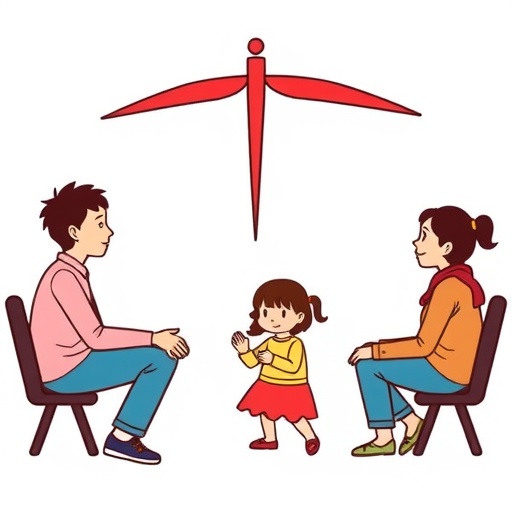In recent years, the concept of helicopter parenting has gained attention globally, as researchers seek to understand its implications on children’s development and social competencies. A new study, led by researchers Koh, Ong, and Goh, investigates the effects of helicopter parenting specifically among single Malaysian adults, revealing fascinating insights into how these parenting styles influence social skills and interpersonal relationships. The study elegantly intertwines cultural elements of filial piety, providing a unique perspective on relationships within families and their broader societal implications in Malaysia.
Helicopter parenting, characterized by excessive oversight and involvement in children’s lives, has often been cast in a negative light. Critics argue that such parenting stifles independence and provokes anxiety among offspring. The researchers embarked on this study hypothesizing that Malaysian society, steeped in traditional values of filial piety—wherein respect and care for parents are paramount—might present a nuanced understanding of helicopter parenting. This study will shed light on whether these parenting styles contribute positively or negatively to social competence among Malaysian adults.
The researchers gathered a comprehensive dataset by surveying single Malaysian adults across various ages and backgrounds. By employing validated psychological scales to measure social competence and the degree of helicopter parenting experienced, the authors undertook a thorough quantitative analysis. This analytical approach allowed them to distill the complex dynamics between helicopter parenting styles and social competencies while considering the moderating effects of filial piety clearly.
One of the key findings of the research reveals that helicopter parenting can lead to lower levels of social competence among single adults. This seems counterintuitive, especially within a culture that values close familial ties. However, the data suggest that children raised with a high degree of parental oversight struggle with decision-making and assertiveness. These challenges manifest as difficulties in forming friendships or developing romantic relationships, which are crucial aspects of adult social competence.
On the flip side, the study uncovered that filial piety significantly moderates these outcomes. For individuals who strongly embrace filial piety, the repercussions of helicopter parenting on social competence appear less severe. This suggests that while helicopter parenting may limit independence, the cultural expectations surrounding family bonds can serve as a buffer, encouraging social engagement and supporting adult relationships despite overly involved parenting styles.
The nuances of this relationship highlight the importance of cultural context in understanding parenting dynamics. In Malaysia, the traditional value system emphasizing respect for elders and family cohesion seemingly offers protective mechanisms for individuals who may otherwise suffer from the adverse effects associated with helicopter parenting. This finding sends an essential message to parents: balancing involvement while inculcating independence is key, especially in culturally rich environments.
Another surprising revelation from the study relates to gender differences in responses to helicopter parenting. According to findings, single Malaysian women appeared to be more affected by helicopter parenting than their male counterparts, demonstrating lower levels of social competence linked to high parental involvement. This gender disparity raises essential questions about the expectations placed on women in culturally conservative societies and how these issues might interplay with social upbringing.
Delving deeper into the implications of these findings, the researchers urge educators and policymakers to consider the impacts of parenting styles on adult relationships. If helicopter parenting leads to diminished social abilities in young adults, addressing this issue could be imperative for fostering healthier future generations. Investing in parent education programs that promote awareness of balanced parenting strategies might prove beneficial not only to families but also to the broader society.
While some may argue that helicopter parenting is a pervasive issue limited to Western societies, this study suggests it is indeed a global phenomenon, deeply rooted in cultural specifics. For parents in Malaysia, the findings serve as a clarion call to reshape how they engage with their adult offspring while respecting their autonomy. This delicate balance between guidance and independence can foster not only healthier parent-child relationships but also a more actively engaged society overall.
Moreover, this research provides a platform for future studies aiming to explore the intersectionality of culture, parenting styles, and their mental health implications. Researchers could expand this study’s framework by examining other variables such as economic status, educational background, and regional differences within Malaysia. Broadening the scope could yield further insights into how adaptation and resilience manifest among diverse populations.
In conclusion, the study conducted by Koh, Ong, and Goh emerges as a significant contribution to understanding the effects of helicopter parenting on social competence in single Malaysian adults. By intricately weaving together the threads of cultural values, parenting styles, and individual outcomes, this research enriches the discourse surrounding familial relationships. With these insights, families can work toward nurturing not only healthy attachments but also empowered individuals prepared to navigate their paths with confidence.
This work serves as an important reminder of the impact that upbringing has on adult lives and the necessity of fostering environments where independence and social competence can flourish harmoniously. As society evolves, so too must our understanding of parenting dynamics to cultivate generations that are emotionally equipped for the complexities of modern adult life.
Ultimately, this study urges a deeper examination of our roles as parents, educators, and community members. By truly understanding the implications of our approaches to parenting, we can create a richer, more supportive environment that nurtures independence while also promoting the enduring bonds of family and cultural heritage.
Subject of Research: The effects of helicopter parenting on social competence among single Malaysian adults, and the moderating role of filial piety.
Article Title: Helicopter Parenting and Social Competence Among Single Malaysian Adults: Filial Piety as a Moderator.
Article References:
Koh, D.MY., Ong, J.Z. & Goh, P.H. Helicopter Parenting and Social Competence Among Single Malaysian Adults: Filial Piety as a Moderator.
J Adult Dev (2025). https://doi.org/10.1007/s10804-025-09543-9
Image Credits: AI Generated
DOI:
Keywords: Helicopter parenting, social competence, filial piety, Malaysian adults, cultural dynamics.




